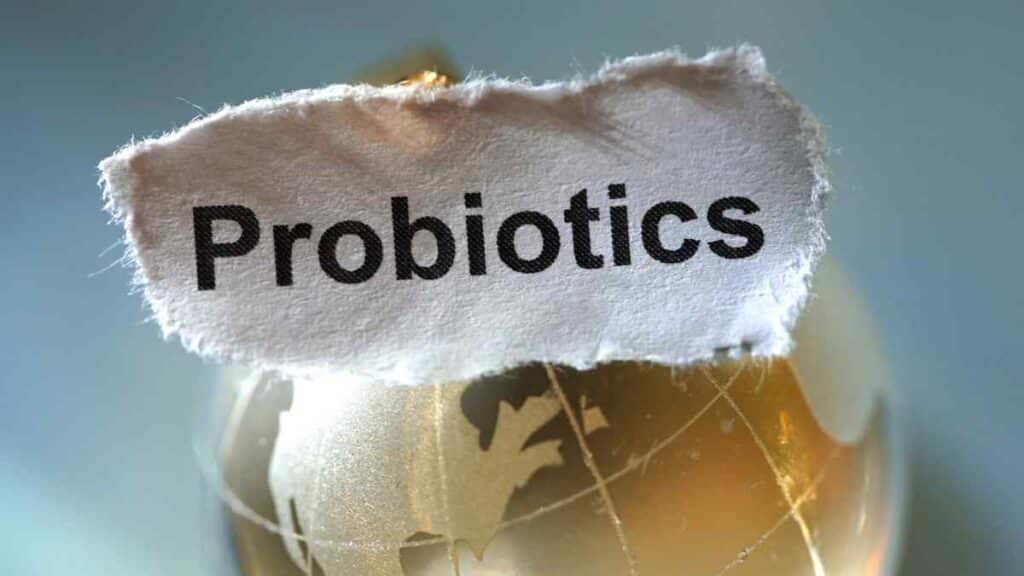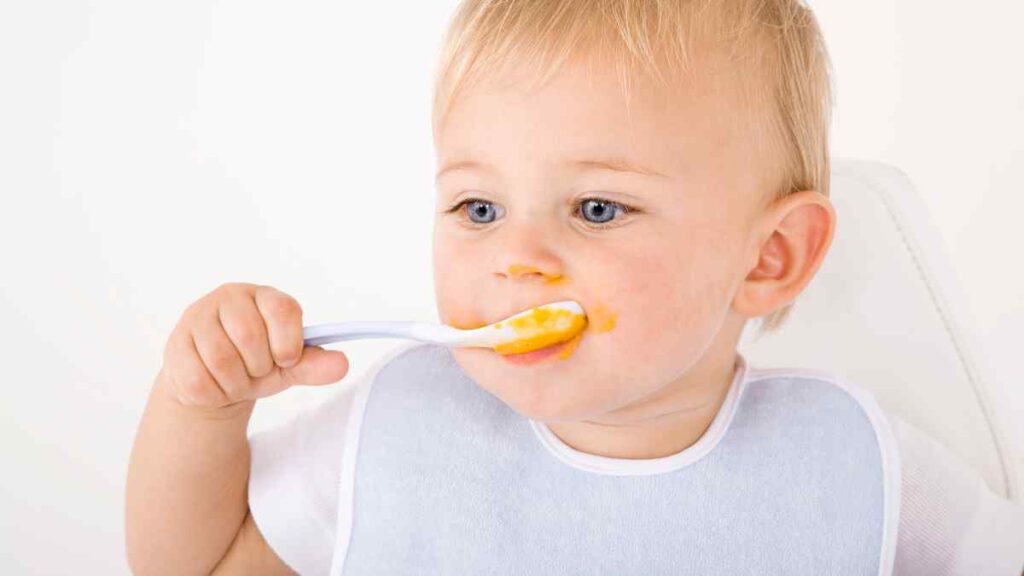Parents often feel heartbroken seeing their infants distressed and seeking ways for soothing baby’s tummy. But did you know probiotics can be a safe and effective way to soothe your baby’s tummy troubles?
This article will explore the top probiotics that can help support your baby’s digestive health soothing baby’s tummy. Ease their discomfort, and promote overall wellness. From colic to constipation, we’ve got you covered with probiotics specially formulated to meet your baby’s unique needs. So let’s dive in and discover the power of probiotics for soothing baby’s tummy troubles!

Why Are Probiotics Important?
In the past few years, food probiotic dietary supplements have become pretty standard in everyone’s diet. You’d often see them advertised as an aid to healthy digestive and immune health. Meanwhile, baby probiotics are now being promoted as an excellent supplement for healthy gut health and can aid in treating conditions such as diarrhea, allergy, and treatment to colicky babies.
Babies naturally have a sterile digestive system. After birth, they get to introduce bacteria into their gut by means of breast milk or formula milk, which later passes through because of the solid food that they eat. Baby probiotics are meant to help promote a healthy bacterial colonization of your toddler’s digestive and immune health or act as a restoration supplement if it has been agitated [1].
But what’s even great about baby probiotics is that each strain has its specific effects on the body, meaning each type of baby probiotic acts differently. Let’s take a deep dive into the benefits of baby probiotics to help you learn more about them.
Boosting a Healthy Immune System
One of the most significant benefits of probiotics for babies is that they can help boost their immune system. Research has shown that the gut microbiome plays a crucial role in the development and function of the immune system. Providing baby probiotics can help strengthen their immune systems and soothing baby’s tummy.
Protects Tummy from Diarrhea and Constipation
Babies have a delicate digestive tract, making them more prone to various digestive issues such as constipation and diarrhea. Consuming baby probiotics contribute to better digestive tract regulation and prevents tummy problems.
Boost Healthy Skin
Babies with skin conditions can also find probiotic supplements to be beneficial. That’s because these beneficial bacteria help improve 3skin health by addressing inflammation while boosting ceramide production, helping address various skin problems such as eczema.
Promotes Better Brain Development
Baby probiotic drops also play a crucial part in a baby’s brain development and function. Since baby probiotic drops benefit healthy gut bacteria, they can help create a positive impact on the baby’s brain development.
Helping with Colic
Colic is a common condition in babies that causes them to cry excessively for no apparent reason. Probiotics have been shown to help reduce colic symptoms and improve babies’ overall health and well-being.

Top Probiotic Supplements for Your Baby’s Immune System
As previously mentioned, probiotics can be incredibly beneficial for babies’ overall health and well-being. They help support the immune system, promote digestive health, and can even improve skin conditions like eczema. If you’re considering giving your baby the best baby probiotics, you might be wondering which ones are the best. In this column, we’ll look at nine top probiotic supplements for your baby’s immune system.
NOW Berrydophilus Kids
These BerryDopphilus chewable tablets are designed for toddlers ages two and beyond. It contains ten probiotic strains essential to a baby’s developing gut microbiota and immune system. Although it is entirely sugar-free, it contains xylitol, so it’s crucial to store them where your dogs won’t reach them.
Renew Life Kids Ultimate Flora Probiotic
Renew Life supplements contain at least three billion cultured good bacteria and six strains of probiotics. It’s also gluten-, sugar-free, and dairy-free and contains no artificial flavors or sweeteners. What’s great about it is that you can store it on either your shelf or your fridge, making it much easier to manage compared to other supplements on the list.
SmartPants Kids Probiotic and Prebiotic Immunity Formula
Similar to Renew Life Probiotics, SmartPants Kids Probiotics are free of artificial sweeteners and have been formulated to support healthy digestive tracts and better immunity. These products also contain a blend of two probiotic strains for better gut health. Also, this gluten-free product is and doesn’t contain any ingredients that may trigger food allergies.
Culturelle Baby
Culturelle Baby is another product that’s highly recommended by many pediatricians. It also contains Lactobacillus rhamnosus GG, which is an essential live bacteria that are excellent for occasional tummy discomfort and immune support. Culturelle Baby has five different variants formulated based on the toddler’s age and needs.
Mommy’s Bliss Probiotic Drops
Mommy’s Bliss Probiotic Drops also contain pure Lactobacillus rhamnosus GG, which is also good for preventing antibiotic-associated diarrhea, occasional tummy discomfort, and immune support. It also has three variants which are ideal for newborn babies and above.
If Your Baby Has Colic
No parent would want to see their babies cry and fuss for hours on end, especially without knowing the reason why it’s happening. Colicky babies often feel their tummies disrupted because of digestive tract issues caused by irritable bowel syndrome. If your baby has colic, then it may be worth trying to find ways to support natural digestive balance through baby probiotic drops.
In addition to soothing baby’s tummy colic, probiotic drops can also have other health benefits for babies. They can help boost the immune system, prevent diarrhea and constipation, and support brain development.
It’s essential to note that not all probiotics are created equal, and choosing a high-quality product specifically designed for infants is vital. Speak to your pediatrician before introducing probiotics to your baby’s diet to ensure it’s the right choice for your little one.

What do I Need to Know Before Giving my Child a Probiotic?
If your child is experiencing digestive issues or could benefit from a boost to their immune system, consider probiotic drops. Probiotics can be a helpful addition to a child’s diet, but before you give them to your little one, you should know a few things.
- Baby probiotic drops are a popular option for parents looking to provide their babies with the health benefits of probiotics besides breast milk. These drops can be added to breast milk or formula and are specifically designed for infants. They contain strains of bacteria naturally found in the gut and can help promote a healthy digestive system.
- Breast milk is an excellent source of infant probiotics, as it contains beneficial bacteria that help build a healthy gut microbiome. However, some infants may need additional support, especially if they were born prematurely or have been exposed to antibiotics.
- Before giving your child probiotic drops, speaking to your pediatrician is essential. They can help determine if probiotics suit your child and recommend a specific product.
- It’s also essential to choose high-quality probiotic drops specifically designed for infants. Look for probiotic drops containing strains of bacteria known to be beneficial for babies, such as Lactobacillus and Bifidobacterium.
- When introducing probiotic drops to your child’s diet, start with a small amount and gradually increase the dosage over time. Doing so can help prevent adverse reactions and allow your child’s digestive system to adjust.
- It’s important to note that probiotics are not a substitute for medical treatment or breast milk. If your child is experiencing severe digestive issues, seeking medical attention is essential.
Types of Probiotic Supplements for Babies
Now that you know what to consider before giving your child probiotic supplements, it’s time to explore the different baby probiotics available for babies. Here are some of the most common types of probiotics for infants:
Liquid or Powder Probiotic Strains
Liquid or powder probiotic drops are popular for parents, as you can easily add them to breast milk or formula. These drops typically contain a mix of beneficial probiotic strains, such as Lactobacillus and Bifidobacterium, and can help promote a healthy gut microbiome.
Chewable Probiotic Tablets
Chewable probiotic tablets are an option for older babies who have started eating solid foods. These tablets typically contain a higher concentration of infant probiotics and can help support immune function and digestive health.
Prebiotic and Probiotic Supplements
Prebiotics and infant probiotics combine prebiotics, which helps feed the healthy bacteria in the gut, and probiotics. Doing so can be a helpful option for babies needing additional digestive system support.
Yogurt and Other Probiotic Foods
Yogurt and other baby probiotic foods can be a natural source of good bacteria for babies. However, choosing products specifically designed for infants and free from added sugars and other ingredients that may not be suitable for babies is essential.

How to Give Baby Probiotics
You may wonder how to administer organic liquid probiotic supplements if you’ve decided to give your baby liquid probiotics. Liquid probiotics are popular for parents looking to support their baby’s digestive and immune health, as you can easily add them to human milk or formula. Here are some tips for giving your baby liquid probiotics:
Choose a High-Quality Infant Probiotic Supplement
Before giving your baby probiotics, choosing a high-quality infant probiotic supplement is essential. Look for a product that contains probiotic strains of good bacteria, such as Lactobacillus and Bifidobacterium, specifically designed for babies.
Read the Label Carefully
Be sure to read the label carefully before giving your baby probiotic supplements. Pay attention to the recommended dosage and specific instructions, such as refrigeration requirements.
Add Probiotic Supplements to Your Baby’s Bottle
One of the easiest ways to give your infant probiotics is to add them to their bottle. Measure the recommended dosage and add the good bacteria to the bottle before shaking it.
Use a Dropper to Administer Probiotic Supplements
If you’re not using a bottle, you can use a dropper to administer baby probiotic supplements directly into your baby’s mouth. Gently place the dropper in the corner of your baby’s mouth and slowly release the drops.
Mix Baby Probiotic Supplements with Breast Milk or Formula
Another option is to mix the baby probiotic supplement with human milk or formula before giving it to your baby. Doing so can help mask the taste of the drops and make them easier for your baby to swallow.
Can Probiotics Cause Upset Tummies in Babies?
While probiotics can be a helpful tool for supporting your baby’s digestive and immune health, some parents may worry about probiotics’ potential to cause upset babies’ tummies. In this column, we’ll examine whether probiotics can cause tummy troubles in babies and what you can do to minimize any potential issues.
As we discussed in our previous column, giving your baby probiotic drops can effectively support their digestive and immune health. However, it’s vital to introduce probiotics gradually and monitor your baby’s reaction.
Probiotics can sometimes cause tummy troubles like gas, bloating, and diarrhea. This can happen if your baby’s digestive system is unused to introducing new bacteria. It’s essential to start with a small dosage of probiotics and gradually increase it over time to allow your baby’s digestive system to adjust.
Another factor to consider is the quality of the probiotic supplement. Not all probiotics are created equal, and some may contain additives or allergens that can cause tummy troubles in babies. Be sure to choose a high-quality infant probiotic supplement specifically designed for babies.
Speaking to your pediatrician before introducing new supplements to your baby’s diet is also essential. They can help determine if probiotics are right for your child and recommend a specific product.

Conclusion
Probiotics can be an effective and safe option for soothing baby’s tummy troubles. It is important to note that while probiotics can be helpful, they should not be used as a replacement for medical advice or treatment. It is always best to consult your pediatrician before giving your baby probiotics or changing their diet. With proper guidance and care, probiotics can be a valuable tool in helping your baby feel better and promoting their overall health and well-being.
Please feel free to ask any questions in the comments below.



